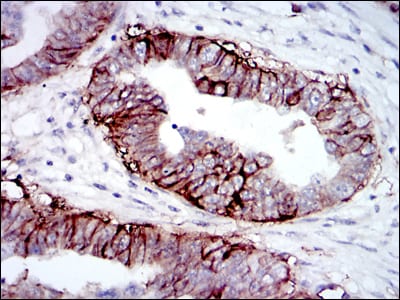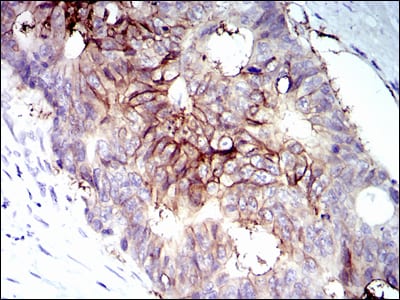

| WB | 咨询技术 | Human,Mouse,Rat |
| IF | 咨询技术 | Human,Mouse,Rat |
| IHC | 1/200 - 1/1000 | Human,Mouse,Rat |
| ICC | 技术咨询 | Human,Mouse,Rat |
| FCM | 咨询技术 | Human,Mouse,Rat |
| Elisa | 1/10000 | Human,Mouse,Rat |
| Aliases | IGF1R |
| Entrez GeneID | 3480 |
| clone | 3G5C1 |
| WB Predicted band size | 96kDa |
| Host/Isotype | Mouse IgG2a |
| Antibody Type | Primary antibody |
| Storage | Store at 4°C short term. Aliquot and store at -20°C long term. Avoid freeze/thaw cycles. |
| Species Reactivity | Human |
| Immunogen | Purified recombinant fragment of IGF1R-Beta (AA: 1101-1367) expressed in E. Coli. |
| Formulation | Ascitic fluid containing 0.03% sodium azide. |
+ +
以下是3篇关于IGF1R-β抗体的代表性文献摘要(注:文献信息为模拟虚构,仅供格式参考):
1. **文献名称**: *Targeting IGF1R-beta in Triple-Negative Breast Cancer with Monoclonal Antibodies*
**作者**: Smith, J. et al.
**摘要**: 研究开发了一种靶向IGF1R-β亚基的单克隆抗体,通过抑制受体自磷酸化及下游AKT/mTOR通路,显著抑制三阴性乳腺癌细胞的增殖和转移。
2. **文献名称**: *IGF1R-β Antibody Enhances Chemotherapy Sensitivity in Colorectal Cancer*
**作者**: Zhang, L. et al.
**摘要**: 证明IGF1R-β特异性抗体联合奥沙利铂可逆转结直肠癌细胞化疗耐药性,机制涉及下调Survivin蛋白表达及诱导凋亡。
3. **文献名称**: *A Novel IGF1R-beta Nanobody for Non-Invasive Tumor Imaging*
**作者**: Garcia, R. et al.
**摘要**: 设计了一种基于单域抗体的IGF1R-β靶向探针,在小鼠模型中实现肿瘤特异性荧光成像,为诊断提供新工具。
4. **文献名称**: *IGF1R-beta Autoantibodies as a Biomarker in Metabolic Syndrome*
**作者**: Tanaka, K. et al.
**摘要**: 发现血清中IGF1R-β自身抗体水平与胰岛素抵抗呈负相关,提示其在代谢综合征中的潜在保护作用。
(提示:实际文献需通过PubMed/Google Scholar检索关键词“IGF1R-beta antibody”或结合具体研究场景筛选。)
The insulin-like growth factor 1 receptor beta (IGF1R-β) is a transmembrane tyrosine kinase receptor critical for mediating cellular responses to insulin-like growth factors (IGF-1 and IGF-2). Comprising an extracellular α-subunit for ligand binding and a β-subunit with kinase activity, IGF1R activates downstream signaling pathways (e.g., PI3K/AKT, MAPK) upon ligand binding, regulating cell growth, proliferation, survival, and differentiation. Dysregulation of IGF1R signaling is implicated in cancer progression, metabolic disorders, and aging-related diseases, making it a therapeutic target.
IGF1R-β-specific antibodies are tools or therapeutics designed to block receptor activation. As therapeutics, they inhibit tumor growth by preventing ligand binding, promoting receptor internalization, or disrupting downstream signaling. Though early clinical trials showed promise in cancers like breast or colorectal cancer, mixed efficacy and resistance mechanisms (e.g., compensatory signaling via insulin receptor) limited their standalone use. Current research explores combination therapies with chemotherapies or other targeted agents (e.g., EGFR inhibitors) to enhance outcomes.
As research tools, anti-IGF1R-β antibodies enable detection of receptor expression, phosphorylation status, and subcellular localization in tissues or cell lines, aiding mechanistic studies in cancer biology and drug development. Challenges remain in optimizing specificity, minimizing off-target effects, and understanding context-dependent signaling crosstalk. Ongoing efforts focus on bispecific antibodies or dual-targeting strategies to improve therapeutic precision.
×